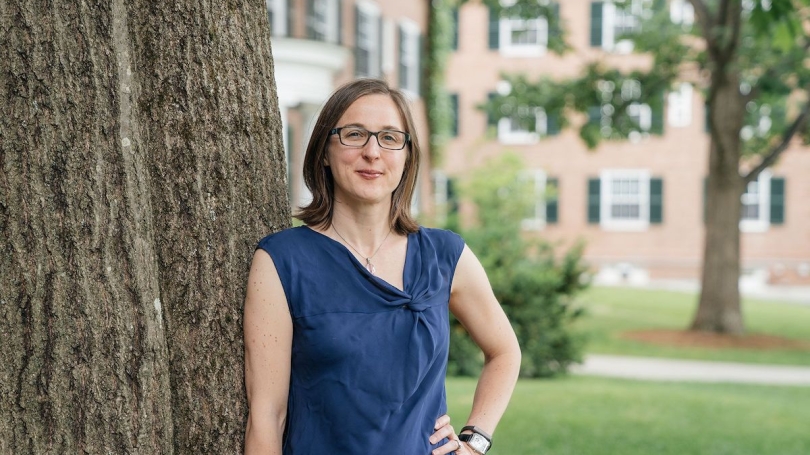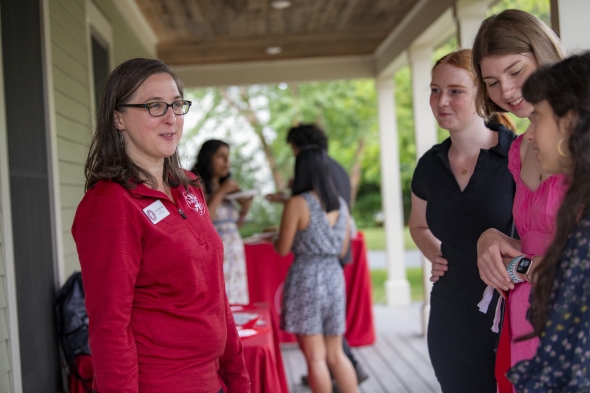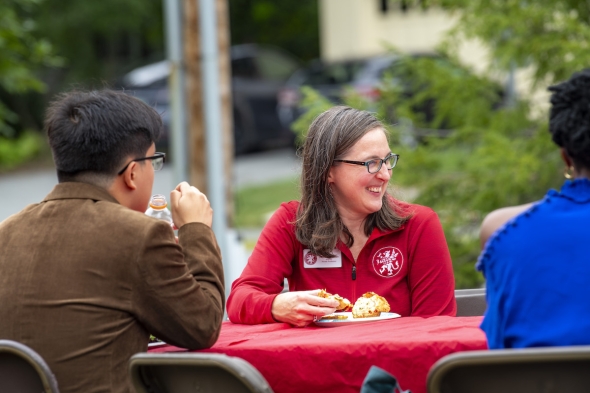

Sociologist Janice McCabe's research illuminates how students can maximize meaningful social ties—an "under-recognized resource" in an era of loneliness.
Janice McCabe embarked this fall on her seventh year as a house professor on the Dartmouth campus—and it's hard to imagine someone better suited for the role.
The associate professor of sociology studies friendship networks, particularly among college students. Her 2016 book, Connecting in College: How Friendship Networks Matter for Academic and Social Success, shows how friendships can both help and hinder student success during and after college.
McCabe's next book, tentatively titled Making, Keeping, and Losing Friends: How Campuses Shape Student Networks and slated for 2025, explores how higher ed institutions influence student networks—and how students can maximize meaningful social ties.
It's a timely topic in the midst of the "loneliness epidemic" detailed by U.S. Surgeon General Vivek Murthy in his recent visit to Dartmouth and 2023 advisory—which underscores how some of the highest rates of loneliness occur among college-age young adults.
"I think it's a really interesting puzzle that college students are literally surrounded by potential friends, yet they often think everyone but them has friends, and so many people are lonely," McCabe says. "These social ties are an under-recognized resource for college students."
A palpable enthusiasm for getting to know students—and helping them make friends—complements McCabe's scholarly interests.
All undergraduates are assigned to one of six houses when they arrive as first-year students, and they maintain their affiliation to their house throughout their time at Dartmouth. Each house is overseen by a house professor who lives in a single-family home near the student residences.

"Getting to know students and seeing them change and grow over time is really what I enjoy most," says McCabe, the house professor of Allen House, which includes Gile, Streeter, and Lord residence halls.
McCabe's new research on college friendships underscores the important role of Dartmouth's house communities in fostering networks that support student success.
"I've seen students who at first seemed kind of shy or like they hadn't found their place on campus be able to really feel that sense of belonging," she says. "And I enjoy introducing people to each other at dinners and things like that because often I'll know little bits and pieces about students so I can help identify those points of connection."
How college campuses shape student networks
McCabe's 2016 book on student friendships identified three network types, each of which comes with specific benefits and drawbacks during and after college. Awareness of these trends can help students understand how their networks are helping or hindering them.
"Tight-knitters" have one densely woven friendship group, where nearly all of their friends know each other. "Compartmentalizers" have networks divided into two to four separate clusters. And "samplers" collect friends one by one from a variety of places, such as campus organizations, classes, and workplaces, resulting in friends that are less connected to one another.
Soon after the book came out, McCabe shared chapters with students in her Youth in Society class and asked them: Which type of network do you think is most prominent at Dartmouth?
"I had expected them to say that Dartmouth students would be tight knitters because of our small campus, and I was surprised when they told me that they thought Dartmouth students would be samplers," she says.
McCabe was also surprised that scholarly research had yet to investigate basic processes of making friends, keeping friends, and losing friends on college campuses.
"As a social psychologist, I think a lot about these micro-level connections between people like friendships," she says. "And then as a sociologist of education, I think about the structures of institutions and how they influence students."
Her conversations with students inspired McCabe to focus her new research and forthcoming book on an analysis of student friendship networks at three types of institutions: a community college (Manchester Community College), a liberal arts college (Dartmouth), and a research university (University of New Hampshire).
As part of the project, McCabe interviewed 25 to 35 students at each institution halfway through college and then again after graduation. The three network types were present on all three campuses, she discovered, with "compartmentalizers" the most common—and particularly common at Dartmouth.
One challenge of this network type is keeping up with each cluster of friends.
"I think the D plan and the quarter system are a big part of why there are more compartmentalized networks at Dartmouth," McCabe says. "During their first year, students form a group of friends at campus residences. But in their second and third year, they and their friends are off campus at different points in time. So it encourages students to make new groups of friends, which can be good for students if their current friendships aren't working for them. But it can be hard if you have a good group of friends and you want to maintain those ties."
One institutional structure that helps maintain these ties is Dartmouth's house system.
Students can participate in their respective house programs and activities throughout their college experience, even when they live off campus.
"When students return to campus after being away for a term or two, they're always welcome back to their house communities, where they will find familiar faces," McCabe says. "I see us as doing important community-building work."
Social ties: An under-recognized resource for college students
McCabe emphasizes that time spent with friends isn't wasted time.
"Friendships are important, both academically and socially," she says. "We often focus on academics, which are clearly important, but friendships matter too."

McCabe also urges students to reflect on their choice of friends. "It's not just about having friends— it's about having meaningful friends, and making sure to invest time in those ties," McCabe says. "And in turn, this sometimes means not being afraid to let other friendships go, even friendships that had been important in the past. More isn't always better."
In her new book, McCabe also elaborates on a concept coined by sociologist Lee Cuba called a "friendship market."
"I apply this term to the fleeting moment at the beginning of the first year of college at residential colleges, when people are particularly open to making friends," she says.
During orientation programming that is specific for first-year students, there are "buyers" and "sellers," McCabe explains, and people are making friends fairly quickly and intensely. But then the market closes, and students can feel stuck with the people they have at that particular time.
"I think it's useful to be aware that there's this more open period where you can explore and find a group that works well for you or individual friends, knowing that it will be more difficult to make friends after this point," McCabe says. "Lots of people do, yet it's harder. Having some awareness of that particular friendship market period is useful for students as well as administrators and institutions."
McCabe identifies other moments in college that function like smaller friendship markets, such as the beginning of a study abroad program, but sees potential in institutions exploring how they might help extend the openness to friendship that permeates the first few weeks of college.
Breaking myths about college friendships
In her interviews with students, McCabe found that some would apologize for not having a tight-knit group of friends.
"We tend to romanticize college friendships," McCabe says. "A lot of TV shows set during and after the college years show one group of friends, what I call the tight knitters, but they're actually a minority of people. So people are comparing themselves to a standard that isn't that common. I think we don't talk enough about the struggles and the changes that happen over time—the work that goes into making friends, even in college."
It's a lesson McCabe came to terms with herself when she was an undergraduate student at Tulane University in New Orleans.
A double major in sociology and women's studies, she took part in a women's studies research cohort during her senior year.
"There were six women's studies majors, so it was a pretty small cohort," McCabe recalls. "When we met together for the first time, one of the women in the group said, 'I thought as a women's studies major that I would have really strong women's friendships, but I don't.' It was a consciousness-raising moment where everyone was like, 'I thought I would too, and I don't either.' We had friends, but we didn't have those strong women friendships that we thought we would have."
The group asked their professor if they could dedicate their research to women's friendships, which turned into a year-long project.
"Through this class project and spending so much time together, we developed those strong bonds that we hadn't experienced before," recalls McCabe, who remains close friends with one of her classmates, over 20 years later.